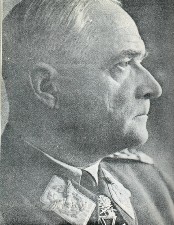Robert Ritter von Greim
|
|
Robert Ritter von Greim or Robert Greim (June 22, 1892 - May 24, 1945) was a German pilot and army officer.
Born in Bayreuth, son of a Bavarian police captain. Greim was an army cadet before World War I and initially served in the artillery before transferring to the German Air Service (Fliegertruppe) in 1915. First flying two-seaters, Greim then joined the Jasta (Jagdstaffel, fighter squadron) 34b flyers for a period in 1918, after Jasta 34b had been equipped with 'cast-offs' from Jagdgeschwader (JG) I, the unit which had been commanded by Manfred von Richthofen until his death in action on April 21. Even though the machines were second-hand, they were warmly welcomed by Jasta 34b as being superior to the older Albatros and Pfalz fighters that they had been previously equipped with. In June 1918, Greim had an encounter with a Bristol Fighter, and his aircraft lost its cowling. This struck and damaged his top wing, along with the lower left interplane strut, but he managed to land the machine successfully.
By the war's end he had scored 28 victories, and had been awarded the Pour le Mérite, and the Bavarian Max-Joseph Order. This latter award made him a Knight (Ritter), and allowed him to add both this honorific title and the style 'von' to his name.
Greim was asked by Hermann Göring in 1933 to help rebuild the German Air Force and in 1934 was nominated for the command of the first school of fighter pilots following the closure of the secret flying school near the city of Lipetsk in the USSR during the era of the Weimar Republic when Germany had been forbidden, under the terms of the Treaty of Versailles, to have an air force, so it had had to train its future pilots in secret.
In 1938, he assumed command of the department of research techniques in the Luftwaffe. Greim would be involved in the Battle of Britain and Operation Barbarossa. Hitler awarded Greim the Knight's Cross with Oak Leaves and Swords (Das Ritterkreuz mit Eichenlaub und Schwertern), which made him one of the most highly decorated officers at that time.
When the Soviet forces had reached Berlin and the Reich was all but doomed, Generaloberst (Colonel-General) Greim flew into Berlin with female flying ace Hanna Reitsch and tried to convince Hitler to fly out of Berlin with him. Hitler refused, but promoted Greim to Generalfeldmarschall, making him the last German officer to achieve the rank of Field Marshal, and appointed him head of the Luftwaffe, having dismissed Göring in absentia for treason on account of his having contacted Allied forces without his consent, with the intention of negotiating a ceasefire. He thus became the second man in the history of the Third Reich to command the Luftwaffe, although with the end of the war in Europe fast approaching his tenure as Oberbefehlshaber der Luftwaffe would last only a matter of days.
Wounded from his landing in Berlin, Greim was still able to leave the city and was later captured by American soldiers on the day of the surrender of the Third Reich, May 8, 1945. Greim, however, was to be part of a Soviet-American prisoner exchange program and, fearing torture and execution at the hands of the Soviets, committed suicide in Salzburg, Austria, on May 24. His final words before taking potassium cyanide were: "I am the head of the Luftwaffe, but I have no Luftwaffe."
Notes
| | |
|---|---|
|
Werner von Blomberg | Hermann Göring | Walther von Brauchitsch | Albert Kesselring | Wilhelm Keitel | Günther von Kluge | Wilhelm Ritter von Leeb | Fedor von Bock | Wilhelm List | Erwin von Witzleben | Walther von Reichenau | Erhard Milch | Hugo Sperrle | Gerd von Rundstedt | Erwin Rommel | Georg von Küchler | Erich von Manstein | Friedrich Paulus | Ewald von Kleist | Maximilian von Weichs | Ernst Busch | Wolfram von Richthofen | Walther Model | Ferdinand Schörner | Robert Ritter von Greim | |
|
Honorary: Eduard von Böhm-Ermolli | |
| | |
|---|---|

